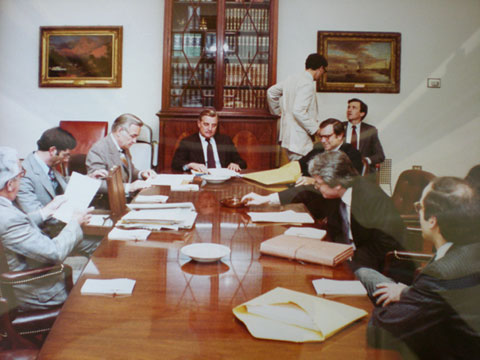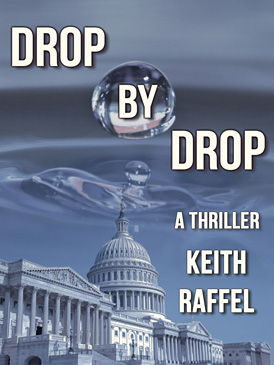Drop By Drop
Behind the Book
I’m going to confess a deep, dark secret right up front—I went to law school. In my own defense, though, I must mention that a summer working for a big Wall Street firm cured me of any desire to enter private practice.
Being young and idealistic, I went down to Washington, D.C., after graduation and managed to wrangle an interview with the staff director of the Senate Select Committee on Intelligence. It went well, but I then needed to pass muster with the chairman, Senator Daniel K. Inouye, Democrat of Hawaii. I knew he’d lost an arm as a hero in World War II, and while sitting in his anteroom, I panicked. How would I shake hands with him if it was his right arm that was missing? It turned out that his right sleeve was indeed the empty one. I stuck out my left hand and shook his. That seemed to work out fine. (I later learned he preferred to grasp your right hand while twisting his left one.)
Senator Inouye opened up the interview by saying, “By the time you get to me you probably will get the job unless you’ve done something bad in the last few weeks. Have you?” I smiled and said, “Well, I’ve taken the bar exam.” He barked, “Did you pass?” No joking with him. The results were months away, but I still replied, “Yes, sir.” I got the position.
The Intelligence Committee had just been made permanent based on the recommendation of the Church Committee, which had deemed the CIA a “rogue elephant.” I started as the junior of three lawyers on the committee staff. Before the end of my first year, the other two had left. I was 27 years old and suddenly the senior attorney on the committee overseeing the government’s secret intelligence activities. Holy shit!
I didn’t realize how much of what happens in my new novel, Drop By Drop, was inspired by my experiences back then till I started writing this “Story Behind the Story” essay. One example: The hero of the book, former Stanford University professor Sam Rockman, has to figure out how to shake hands with U.S. President Lucas, who lost his right arm in Desert Storm.
Senator Birch Bayh (D-Indiana) replaced Inouye as chairman of the committee in my second year on the staff. When I walked down the halls with Senator Bayh, he emphasize each important point with a physical imprint. I gave my book’s Senator Marty Vincent that same quirk:
The senator put his arm around my shoulder as we walked through narrow, twisty corridors. He squeezed. No politician since LBJ pressed the flesh as literally as Senator Vincent. He used a touch, slap, or squeeze to punctuate each statement, just as a writer would turn to an exclamation point, italics, or a bold font.
One time, Senator Bayh called another staff member and me up to his office because we’d given him conflicting recommendations on how to vote on a bill. After 20 minutes or so of discussion, he asked my colleague, “Why are you advocating this position?”
“Because you are running for reelection and your opponent will hammer you if you vote the other way.”
“But Keith is right,” he said.
You can see why Birch lost his seat in 1981 to Dan Quayle. That result was enough to make me question my commitment to democracy. I still gave my fictional Senator Vincent the same deep commitment to the constitution and doing what’s right that I saw from Senator Bayh in real life.
The head of the legislation subcommittee for most of my stint on Capitol Hill was Senator Walter D. Huddleston (D-Kentucky). Unlike almost all his colleagues, he had not run for president, was not running, and had no desire to run. In Drop By Drop I give Senator Vincent that same distinction, as well as the same Kentucky background. Huddleston’s staff used to call him “Senator” as if that were his first name. I might get a call from his admin who would say, “Senator wants you up here.” Or I might come up to speak to him and be told, “Senator is on the floor.” I use all of that in the book, too.

At a White House meeting in 1980, Vice President Walter Mondale sits at the
head of the table with CIA Director Stansfield Turner to his right and Senator Walter D. Huddleston
to Mondale’s left. Keith appears in the foreground, on the right.
In the photo above, I’m in the White House with Senator Huddleston. He’d been invited to the Executive Mansion to discuss the legislative charter for the CIA and the intelligence community we’d been working on. He had been told the meeting was for “principals only.” Senator thought that “principals only” was baloney. He figured congressmen and senators were principals—they were elected by the people. By that criterion, the president and vice president were the only principals in the executive branch. In his view the head of the CIA was no “principal”; he was just a staffer, same as I was. “Principals only” was code for excluding congressional staffers and obtaining an advantage in negotiations. Anyway, when Senator stopped his car at the White House gate before this meeting, the uniformed guard noted that he was on the admission list, but I was not. Senator Huddleston said, “If I’m on the list, so is he,” and he pushed down on the accelerator. What a way to inspire loyalty! An incident unfolds pretty much that same way in Drop By Drop.
Over half of the book’s Senator Vincent I made up. The rest is an amalgam of other senators, including Bayh and Huddleston.
My duties with the committee took me to CIA headquarters in Langley, Virginia, pretty regularly. A fellow in his late 60s or early 70s, whose furrowed, weathered face was protected from the sun by a pith helmet, directed parking at the facility. Effusive as could be, he always called me “Senator” when I hopped out of my car, though I promise in those days I looked more nerd than lawmaker. I use a character based on him in the book, as well.
A signal accomplishment of the Intelligence Committee in those days was passage of the Foreign Intelligence Surveillance Act (FISA), which set up a procedure to obtain warrants for national security wiretaps. (The law seemed to work fine until the second Bush administration decided to ignore it.) Anyway, I was on the Senate floor during the vote on FISA when Senator Ted Kennedy, co-manager of the bill along with Senator Bayh, asked me for a count.
“Ninety-five to one in favor,” I told him. (Note: There were two Senator Scotts in those days, the respected Hugh Scott from Pennsylvania and William Scott from Virginia, once voted the stupidest senator in a Capitol Hill poll.)
“And who was the one?” Senator Kennedy asked.
“Scott of Virginia.”
Senator Kennedy rubbed his hands and said, “Ah, better than unanimous.”
I confess to stealing that line for an early draft of Drop By Drop, but perhaps my conscience got the better of me, because I can’t find it in the final draft.
Two FBI agents visited me one afternoon in the Dirksen Senate Office Building. An internal memo written by the CIA’s general counsel had been found on the sidewalk near my house. They wanted to polygraph me to see if the general counsel and I were conspiring somehow. (To this day, I wonder what was going on.) Unsurprisingly, Sam Rockman has a similar experience in Drop By Drop.
In my fourth year in Washington, the Republicans gained control of the Senate and, as a consequence, conservative lion Barry Goldwater (R-Arizona) took over chairmanship of the Intelligence Committee. Once in a closed hearing, I was seated directly behind Senator Huddleston, ready to whisper in his ear as required. Senator Goldwater’s back was creaky, so whenever he turned to ask a staff member a question, he could only make it three-quarters of the way around. That left him looking directly at me, someone who worked for a Democratic senator. At one point, Goldwater asked a question, and his own staffer hastened to answer as usual. But Goldwater pointed a thumb in my direction, glared at the guy who’d spoken, and growled, “I didn’t ask you. I asked him.” When it came to foreign policy, national defense, and intelligence activities, Senator Goldwater didn’t care much for partisanship.
In fact, partisanship on the committee overall was not quite at the level it reached elsewhere on the Hill. Late one afternoon, I heard from then-Senator Joe Biden (D-Delaware) that he wanted to deliver a speech on the Senate floor the next morning concerning a bill I was working on. I stayed up all night drafting and editing. At 9 a.m. the next morning, I went up the senator’s office, speech in hand. His chief of staff told me that Senator Biden had changed his mind about making the speech. I went back downstairs and hurled the binder holding the draft against the wall of my cubicle. A staffer from the other party, whom I rarely agreed with on anything, heard the crash and stuck his head around the corner to see what was going on. I told him, “Three-quarters of what I do around this place is wasted effort.” He smiled and said, “That makes you the most effective staffer on Capitol Hill.” Republican and Democratic staff members even socialized. A colleague from those days tells me she has a photograph of Fred Thompson, Law & Order district attorney and real-life Republican senator and presidential candidate, taken during a party at my place near Dupont Circle back when Thompson served as special counsel to the committee.
Despite the cross-aisle fraternization, I knew no one in the nation’s capital like Drop By Drop’s Cecilia Plant, the smart-as-a-whip, foul-mouthed, hard-drinking, red-haired six-footer who serves as the Intelligence Committee’s majority staff director and the nemesis of Sam Rockman, who works for the minority party. Even though she was smart, my girlfriend back then in D.C. was a tennis-playing dark blonde who, to the best of my recollection, never dropped an F-bomb. Where did Cecilia come from? My imagination?
When I started writing Drop By Drop, I worried whether that imagination of mine would be able to transport me back to Capitol Hill. As it turned out, once I sat down in my regular place at the local caf� and started guzzling my green tea, I became Sam Rockman, the Senate Intelligence Committee staff member. It was as him I entered a parallel world, similar to this one but different, where a terrorist bomb explodes just yards away from me, where secret documents show up on my doorstep, and where Russians try to poison me. I guess that’s the magic of writing fiction.
